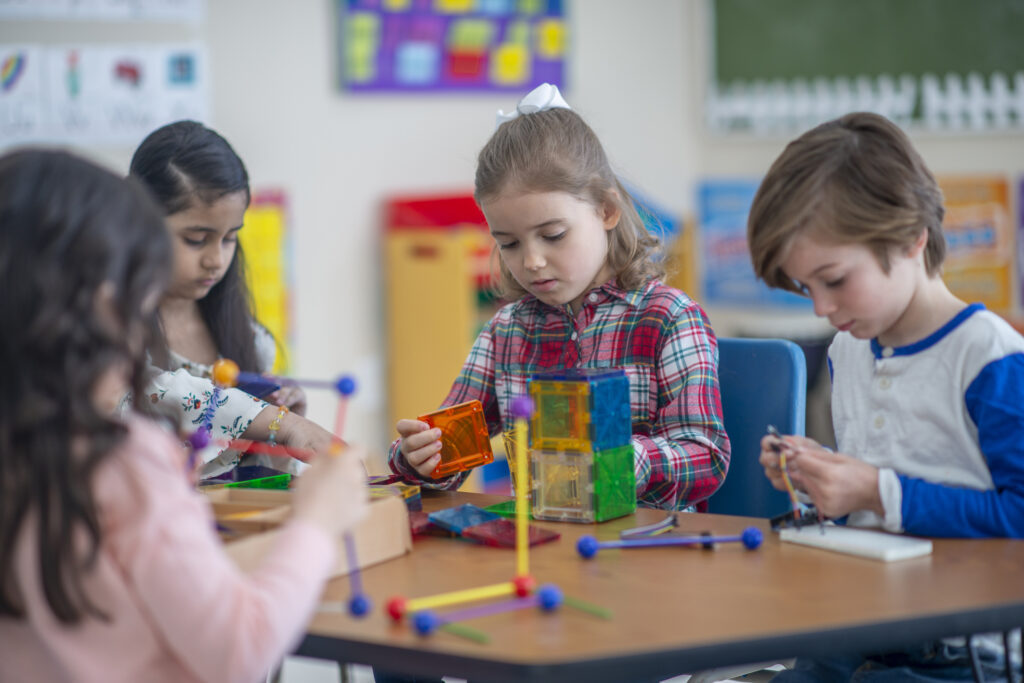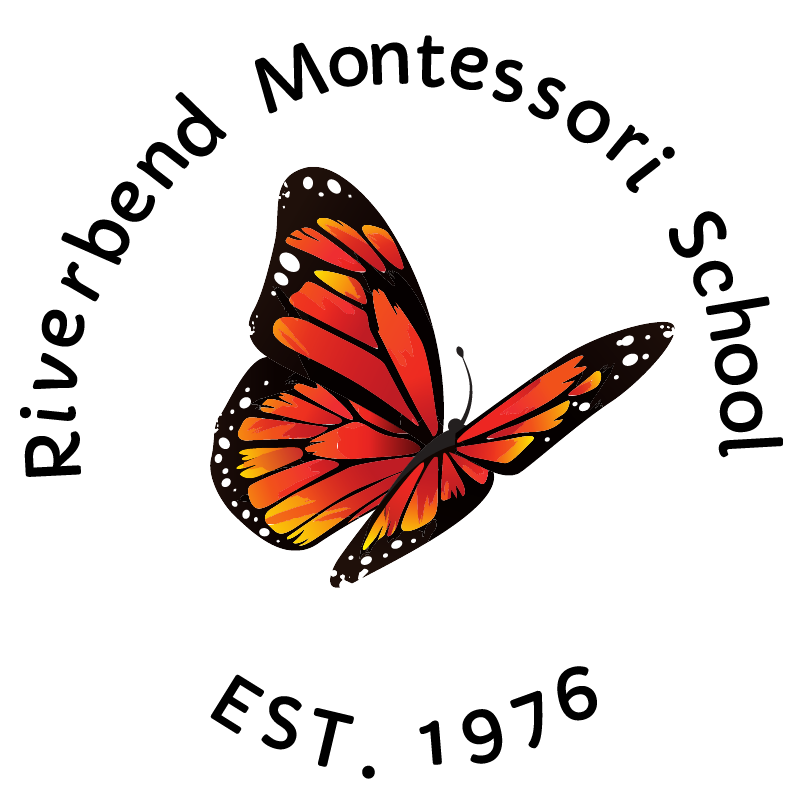Elementary
First through Sixth Grades

About
In the Riverbend Elementary classroom, we believe in two guiding principles when working with our students:
Each child is gifted and talented, each in individual ways; and, each and every child wants to learn and strives to become a competent adult.
Our curriculum is developed to allow the teacher and student to work together so the students achieve mastery of fundamental skills, develop problem-solving skills, and refine social skills. Math and language classwork is individualized so that students work to fulfill their greatest potential in areas of strength and overcome problems in areas of weakness. Every day, the students’ work is checked and corrected with a teacher to achieve mastery. In accordance with the current brain research, our lessons are multi-sensory presentations to meet all distinct learning styles.
Language & Reading
Grammar is taught in an exciting manner through stories and concrete materials. Students learn to identify parts of speech and parts of sentences. Word study instructs students on compounds, antonyms, synonyms, homophones, homonyms, homographs, suffixes, and prefixes to name a few areas, as well as strengthening their vocabulary.
Each day, students read for comprehension at their own grade level. Different genres of literature are introduced to promote fluency and understanding.
Writing
Writing is an integral part of the curriculum, both research and creative. Our students begin with the understanding of a simple sentence structure, paragraph requirements, and finally research paper formats. Research writing allows the students to define a project and determine the questions to be addressed. The students learn to find the necessary information, organize the data, and express it in the correct written form. Research writing is just one format for the students to record their history, botany, zoology, and geography lessons. Students are taught the fundamentals of creative writing. The writing workshop allows the students to develop into creative writers.
Homework
All of our homework is meaningful, related to our studies, and limited in the scope of time. It is not busy work. Instead of memorizing 20 random spelling words, the Scientific Spelling program of Neuhaus Education Center is utilized. In Lower Elementary, students learn phonemic awareness, reliable spelling patterns and rules, and spelling strategies. In addition in Upper Elementary, students are responsible for learning the meaning of the words and being able to use them correctly in a sentence.
In Lower Elementary, our students are working towards mastering math facts. Each week the problems focus on a number family, as well as continuing working with the prior problems.
In Upper Elementary, Saxon textbooks are used for math homework. The student learns to read the lesson and answer the problem set. Saxon homework builds the student’s independence and fosters time management. Saxon textbooks provide a bridge between a traditional textbook and the math concepts the student has mastered in class. Each chapter has follow up problems to assure the students are mastering the concepts, not just moving on to the next lesson.
Literary Circles
Beginning in second grade, students join a Literary Circles group. Our students are reading beyond comprehension and asking questions directed toward literary criticism. The students learn to work in a student-led group completing different jobs designed to analyze. At the end of each book, the students prepare a presentation for the classroom. Literary Circles discussions and presentations spark the student's interest in literature and writing.
Math
In math, our students are learning the process, as well as the right answer. By understanding the process, the right answer will come. Math concepts are introduced with beautiful, concrete, multi-sensory materials. The use of concrete materials allows the student to grasp difficult concepts completely at an earlier age. For example, our third-grade students complete long division problems, and sixth-grader students begin work on solving algebraic equations and solving square roots.
In Lower Elementary, students learn math facts by using many different materials. Games and computer programs are a few items used to enrich learning math facts. Brain research confirms that when the students know the math facts their brain may focus and concentrate on the difficult operation, not the facts.
Geometry
In Lower Elementary, through the use of concrete materials, the students are able to identify triangles and polygons. Our students explore relationships between lines. Students understand the concepts of similar, congruent, and equivalent. Geometry comes to life through songs, games, and stories.
In Upper Elementary, students prove geometric theorems with concrete materials. Students concretely prove the accuracy of the formula of the area of a circle and learn the history of Pi.
History
We begin with the study of The Big Bang. Our students have a thorough understanding of the history of the world. Throughout the year, we study different time periods through the lens of the fundamental needs of people: food, shelter, defense, transportation, clothing, social identity, arts and culture, religion and philosophy, and communication. Whenever possible, we support these studies with field trips to museums and local attractions.
Upper Elementary continues to build on the Lower Elementary lessons starting with the timeline of life to the studies of humans. Students explore ancient, great civilizations. Research and writing are utilized to record their history studies.
Geography
Building on the knowledge gained in the Primary classes, we study each continent. We examine biomes and political boundaries. Our students have a strong knowledge of the world and of their place in the world. Upper Elementary students take a week-long trip each year to examine a different geographic location.
Science
Science lessons are designed to strike the child’s curiosity. Concepts are presented with hands-on lessons to examine scientific principles. Students use the scientific method, starting with a hypothesis, observing what happened, and determining scientific reasoning. Students enjoy experiments supporting physics, chemistry, sound, and light concepts to name a few of the areas of science. These hands-on lessons allow the students to understand scientific concepts. Upper Elementary students build on their knowledge of the scientific method by working on problem-solving. Students discuss variables and determine the effect of such variables on the experiments.
Botany
Students love the hands-on opportunity of discovering botany. Botany starts with the history of plants and continues to the form and functions of plants. Students learn the parts of the plants in the classroom, and then head out to identify these parts in the playground. Watching plants grow and produce fruit and vegetables supports botany studies.
Upper Elementary students conduct experiments to understand the working of plants. Students understand the concepts of plant cells, adaptations, and biodiversity.
Zoology
Students study the classification of living things. The study starts with the simplest forms of life: Bacteria and Protoctista, and continues through to complex mammals. Students have many research opportunities in the study of zoology.
Upper Elementary students enjoy the 6 Kingdom lessons by planning a feast and eating something from each kingdom. After studying the kingdoms and phyla, Upper Elementary studies taxonomy and how to classify living things.
Practical Life
Our classrooms offer many opportunities for students to master time management and organizational skills, both essential life skills. Students work with a daily and weekly planner. They have a choice in the order of work during the morning work cycle, with the knowledge that all work must be completed, checked, and corrected each morning. Upper Elementary students take time management to the next level by adding monthly assignments they need to manage.
All lessons are designed to focus the student on organizing materials. The simple organization of a language lesson expands to the organization of a sentence, paragraph, and research paper. Good organizational skills allow the student to be more productive and efficient. It is easier for students to collaborate when they are organized. Organized students are able to prioritize activities, set and achieve goals, and reduce stress.
Our students have many chances to run meetings. There are large class meetings such as the Literary Circles meetings where the student in the role of director manages the discussion. Small classroom projects allow the students to learn the lessons of collaboration.
Elementary students take care of themselves and others. Students are encouraged to become independent in the preparation of their snacks and lunches, in the responsibility of homework, and in the care of pets. Upper Elementary students run a Hot Lunch program to support their trips.
Specials
Enrichment classes supplement the curriculum. Students participate in art, Spanish, Music, Computer Science, and Physical Education each week.
Performances
Our classes participate in many performances throughout the year such as Winter Plays, Arts Festival, Literary Circles, and Authors’ Tea. These programs encourage poise and confidence in making oral presentations before an audience.
